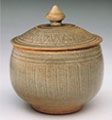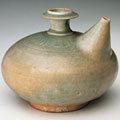 |
|
 |
 |
 |
 |
 |
 |
 |
 |
Ceramics from Thailand
Thai ceramics in the Asia Society's collection come from two areas: north-central Thailand, where the Sawankhalok kiln sites were associated with the political sphere of the Sukhothai Kingdom, and northern Thailand, where more than two hundred kiln sites have been discovered, many of them grouped together and within close range of major cities. The flourishing of a ceramic industry in north-central Thailand during the 14th through 16th centuries and possibly later has been attributed to Chinese trade policies as there was an imperial prohibition of exporting ceramics from China from 1436 to 1465. This Chinese ban spurred the production of ceramics in countries such as Thailand and Vietnam, whose ceramics industries expanded to provide goods that were no longer available from China. Many Thai ceramics, particularly Sawankhalok wares, were exported to Indonesia, the Philippines, and other lands. The best-known Thai ceramics from Sawankhalok are green-glazed wares. Often called celadons in the West (after a character in a 17th-century French play who wore a green costume), ceramics of this style can be traced back to early periods in Chinese history. Ceramics from northern Thailand, however, are not as well known as those from Sawankhalok since their products are only rarely represented among trade wares found abroad. |
 |
 |
| 1 thru 4 of 4 |
 |
| view text only list |
 |

Jar |
 |

Covered Jar |
 |

Spouted Jar (Kendi) |
 |

Jar |
 |
|
 |